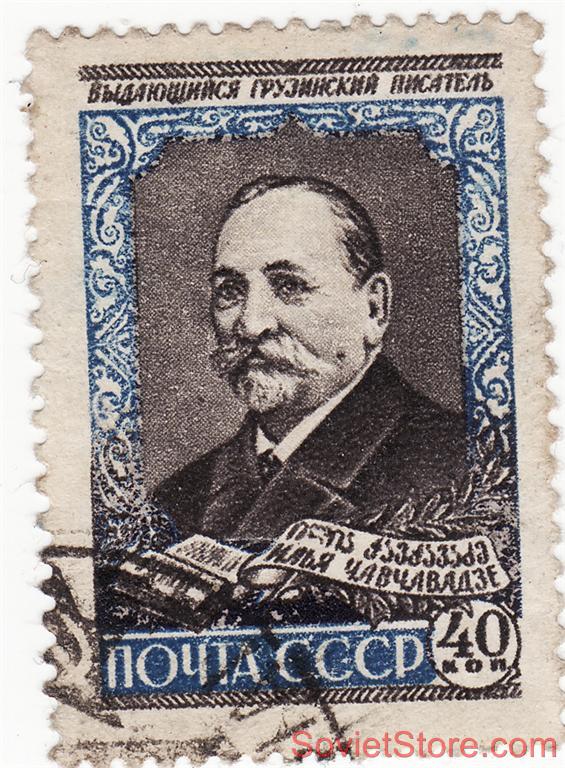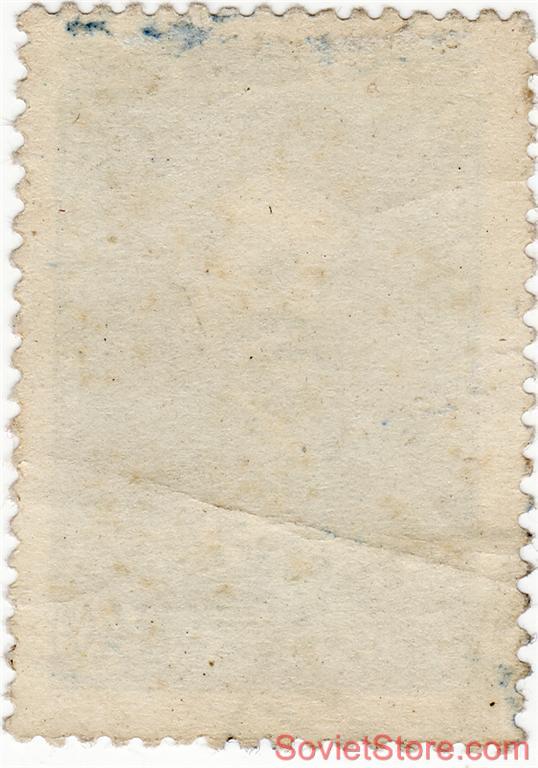SearchProduct Type
|
Add us to: Favorite Stores
Stamp Authenticity Since 1939 till 1990 Lithuania suffered 3 occupations: 1 German (1941-1944) and 2 Soviet (1939-1941, 1944-1990), one of which lasted 46 years. In WWII occupations were based on violent battles between Germans and Russians. These historical events left a lot of stuff behind them selves. Almost every family in Lithuania has something left, related to USSR history in their forgotten drawers. So we are just traveling around lithuanian countrysides and collecting this memorabilia. Item is original, genuine, authentic, unique, not a copy or replica - has 2-12 decades of it's own unique history.
Stamp Story
St. Ilia the Righteous, born Prince Ilia Chavchavadze, known as Ilia Chavchavadze (Georgian: ილია ჭავჭავაძე) (October 27, 1837 – August 30, 1907) was a Georgian writer, poet, journalist and lawyer who spearheaded the revival of the Georgian national movement in the second half of the 19th century, during the Russian rule of Georgia. Today he is widely regarded as one of the founding fathers of modern Georgia. He was canonized as Saint Ilia the Righteous (წმინდა ილია მართალი) by the Georgian Orthodox Church. Today, Georgians revere Chavchavadze as Pater Patriae (Father of the Fatherland) of Georgia.[1] Inspired by the contemporary liberal movements in Europe, as a writer and a public figure, Ilia Chavchavadze directed much of his efforts toward awakening national ideals in Georgians and to the creation of a stable society in his homeland. His most important literary works were: The Hermit, The Ghost, Is He Human, This Man?, Otaraant Widow, and Kako The Robber. He was editor-in-chief of the Georgian periodicals "Sakartvelos Moambe" (1863-1877) and "Iveria" (1877-1905), and authored numerous articles for journals. Most of his work dealt with Georgia and Georgians. He was a devoted protector of the Georgian language and culture from Russification. Chavchavadze was shot to death by a gang of assassins, led by Gigla Berbichashvili, in Tsitsamuri, outside Mtskheta. His legacy earned him the broad admiration of the Georgian people. LifeAncestry and early lifeIlia Chavchavadze was born in Kvareli, a village located in the Alazani Valley, in the Kakheti province of Georgia, which was part of the Russian Empire at that time. Ilia was a tavadi, the Georgian title of prince. It is thought that the noble Chavchavadze family came from the Pshav-Khevsureti region of Georgia, and, in 1726, King Constantine I granted the Chavchavadze family the rank of Prince in recognition of their knighthood and valor to the nation. This resulted in the family moving and settling in the Alazani Gorge in Kakheti. According to King Erekle II's order, Ilia's great grandfather, Bespaz Chavchavadze was knighted when he defeated twenty thousand Persian invaders in Kvareli in 1755. Ilia was the third son of Grigol Chavchavadze and Mariam Beburishvili. Grigol, like his father and his famous ancestors, had a military background. He, along with the local militiamen protected the village from numerous Dagestani invasions. This can be seen in the architecture of the Ilia Chavchavadze museum house in Kvareli, incorporating a Medieval castle style in the two-storey castle in the yard, which was designed to protect the house during invasions. Ilia's mother, Mariam, died on May 4, 1848, when Ilia was ten years old, and his father asked his sister, Makrine, to help bring up the children. Aunt Makrine had a significant impact on Ilia's life, because, after 1852, when Ilia's father Grigol died, she was the only remaining caretaker of the family. Chachavadze was educated at the elementary level by the deacon of the village before he moved to Tbilisi where he attended the prestigious Academy for Nobility in 1848. However, from an early age, Ilia was influenced by his parents who were highly educated in classical literature, Georgian history and poetry. From his parents, Ilia learned the inspiring stories of Georgian heroism in classical historical novels. In his autobiography, Ilia refers to his mother, Princess Mariam Chavchavadze, who knew most Georgian novels and poems by heart and encouraged her children to study them. Ilia also described the influence of the deacon's storytelling, which gave him an artistic inspiration, later applied in his novel writing. In 1848, after the death of Princess Chavchavadze, Ilia was sent to Tbilisi by his father to begin his secondary education. Ilia attended a private school for three years before he entered the 1st Academy of Tbilisi in 1851. Soon after, Ilia's father died and Aunt Makrine looked after the family. His secondary school years were very stressful, due to his father's death. However, the Chavchavadze family suffered another devastating blow when Ilia’s brother, Constantine, was killed during the Dagestani raid on Kakheti. Ilia expressed his anguish and grief in one of his first short-poems called Sorrow of a Poor Man. In addition to his personal problems, the political situation in Georgia worsened under the harsh authority of the Russian Empire, which played a destructive role to the nation and its culture. Student yearsIlia Chavchavadze during his studies at the university in Saint Petersburg, 1860
After graduating from the academy, Ilia decided to continue his education at the University of St. Petersburg, Russia. Before leaving for St. Petersburg, Ilia composed one of his most remarkable poems, To the Mountains of Kvareli in the village of Kardanakhi on April 15 of 1857, where he expressed his lifelong admiration for the Greater Caucasus Mountains and his sorrow at leaving his homeland. That same year, Ilia was admitted to the University of St. Petersburg. During his student years, numerous revolutions sprang up in Europe which Ilia observed with great interest. Ilia's attention focused on the events in Italy and the struggle of Giuseppe Garibaldi, whom he admired for many years. While in St.Petersburg, Ilia met Princess Catherine Chavchavadze, from whom he learned about the poetry and lyrics of the Georgian romantic Prince Nikoloz Baratashvili. Due to the harsh climate in St Petersburg, Ilia became very ill and returned to Georgia for several months in 1859. Ilia finally returned to Georgia after the completion of his studies in 1861. During his journey back, Ilia wrote one of his greatest masterpieces The Travelers' Diaries, where he outlines the importance of nation-building and provides an allegorical comparison of Mt. Kazbegi and the Tergi River in the Khevi region of Georgia. Political lifeNewspaper "Iveria" (Iberia) founded and edited by Chavchavadze during his political career. The newspaper focused on the national liberation movement of Georgia in the late 1800's.
Ilia’s main political and social goals were based on Georgian patriotism. He radically advocated the revival of the use of the Georgian language, the cultivation of Georgian literature, the revival of autocephalous status for the Georgian national church, and, finally, the revival of Georgian statehood, which had ended when the country became part of the Russian Empire. As the number of supporters for his ideas grew, so did opposition among the leading Social Democrats and Bolsheviks like Noe Zhordania; their main aims were focused on battling the Tsarist autocracy and implementing Marxist ideology throughout the Russian empire. This did not include the revival of a Georgian state or of a Georgian self-identity. Ilia was viewed as bourgeois and as an old aristocrat who failed to realize the importance of the revolutionary tide. In addition to his works described above, he was also the founder and chairman of many public, cultural and educational organizations (Society for the Spreading of Literacy Among Georgians, "The Bank of the Nobility", "The Dramatic Society", "The Historical-Ethnographical Society of Georgia", etc.). He was also a translator of British literature. His main literary works were translated and published in French, English, German, Polish, Ukrainian, Belarusian, Russian and other languages. Between 1906 and 1907, he was a member of the State Council (Gosudarstvennaya Duma) in Russia. His eclectic interests also led him to be a member of, among others, the Caucasian Committee of the Geographical Society of Russia, the Society of Ethnography and Anthropology of Moscow University, the Society of Orientalists of Russia and the Anglo-Russian Literary Society (London). Assassination of IliaAfter serving as a member of the Upper House in the first Russian Duma, Ilia decided to return to Georgia in 1907. On August 28, 1907 Ilia Chavchavadze was murdered by a gang of six assassins who ambushed him and his wife Olga while traveling from Tbilisi to Saguramo, near Mtskheta. The assassination of Ilia Chavchavadze remains controversial today. Based on recent discoveries in archives and historical documents, the plot to assassinate Ilia was masterminded by the Social Democrats and the Bolsheviks, due to Ilia's condemnation of their revolutionary ways and his tremendous popularity among the people. During World War II, an old man confessed to having been hired by the Russian gendarmerie to assassinate Ilia. During the Soviet period, an investigation was launched by the Soviet authorities which later concluded that the Tsarist secret police and administration had been involved in the assassination. Either way, the assassination of Ilia was seen as a national tragedy which was mourned by the entire country and by Georgian society. Prince Akaki Tsereteli, who was suffering from serious health problems at the time, spoke at the funeral and dedicated an outstanding oration to Ilia: “Ilia's inestimable contribution to the revival of the Georgian nation is an example for future generations”.[2] In 1987, he was canonized by the Georgian Orthodox and Apostolic Church. LegacyAs a result of Ilia's death, the Bolshevik terror grew, and the Georgian Social Democrats started to gain significant power and support among the population. Eventually, realizing their differences with the Bolsheviks, the Social Democrats of Georgia decided to revive Georgian statehood and proclaimed independence on May 26, 1918. After the Bolshevik occupation of Georgia and integration into the Soviet Union, Ilia became the national symbol of Georgian freedom and national liberation. In 1989, during the anti-Soviet protests in Tbilisi, the poems, novels and political life of Ilia Chavchavadze became a driving force behind the Georgian struggle for independence. The idea of national revival, which Ilia preached and advocated in various Georgian societies throughout his life, gained in momentum in 1990. In 2002, Mikheil Saakashvili, a young Georgian politician who was educated in the United States, created a movement which was to revive the old party of Ilia Chavchavadze, known as the United National Movement. Mikheil Saakashvili’s National Movement party played a major role in the peaceful Rose Revolution of 2003 which ousted President Eduard Shevardnadze. Important publications of the works of Ilia Chavchavadze
On Jun-12-08 at 14:47:55 PDT, seller added the following information:
| Return
Items must be returned within 30 days .
Refund will be given as Money back. Refund policy details: Return is accepted at any reason. Item(s) must arrive to us not later then 30 days after it was shipped out (you will be informed about this immediately after it will be done). Returned items must be the same item in the exact same condition as originally shipped. Refunds are for the final eBay item purchase price only, less a 10% restocking fee. Shipping costs, insurance, and handling charges (if any) are non refundable. Returns must be shipped insured. Shipping
Payment Method
Insurance
Not Offered (Domestic)
|
Shopping Cart |
||||||||||||||||||||||||||||||||||||||||||||||||||||||||||||||||||










